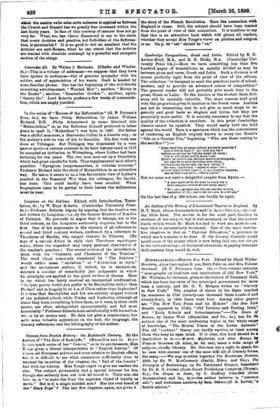In the series of "Heroes of the Reformation" (G. P.
Putnam's Sons, 6s.), we have Philip Melanchthon, by James William Richard, D.D. Philip Schwartserd (a name Grecised into " hfelanchthon," or, as the Reformer himself preferred in latter years to spell it, " Melanthon") was born in 1497. His father was a skilful armourer, a Benvennto Cellini in a humble way ; on the mother's side he was of kin to Reuchlin. His first work was done at Tubingen. But Tfibingen was dominated by a very narrow spirit—a curious contrast to its later history—and in 1518 he accepted an invitation to Wittenberg, where Luther had been lecturing for ten years. The two men soon set up a friendship which had great results for both. They supplemented each other's qualities. "Egregium temperamentum, si virtutes misceres." Professor Richard tells the story of Melancbthon in an attractive way. He takes, it seems to us, a less favourable view of Luther's conduct in the Peasants' War than his colleague, Dr. Jacobs, has done. This could hardly have been avoided. When biographers cease to be partial to their heroes the millennium must be near.






































 Previous page
Previous page